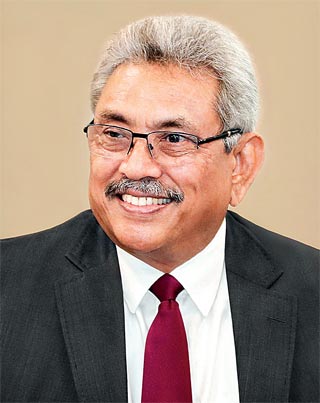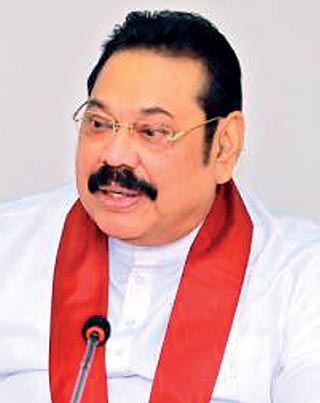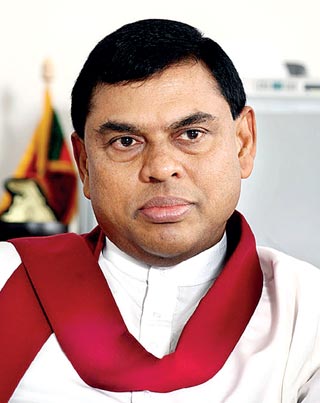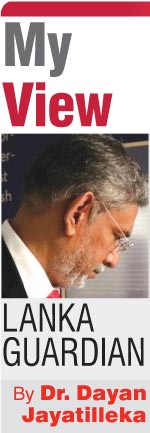Saturday Feb 14, 2026
Saturday Feb 14, 2026
Thursday, 24 March 2022 01:45 - - {{hitsCtrl.values.hits}}

President Gotabaya Rajapaksa

Prime Minister Mahinda Rajapaksa

Finance Minister Basil Rajapaksa
|

An international law firm to deal with the IMF? Only the Rajapaksa regime could come up with that eccentricity. What you do need is a negotiating team of the best Lankan economists (e.g., Howard Nicholas, Nishan de Mel, Dushni Weerakoon) and a top international economist (e.g., Joe Stiglitz, Paul Krugman, Jeff Sachs, or Robert Reich).
The saddest but most accurate metaphor for the state of Sri Lanka today is that Sri Lankans in war-torn Ukraine prefer to stay there than to come back home to Sri Lanka.
There’s no war and no sanctions and Sri Lankans are suffering as if there was the one or the other or both. More people are suffering more than they did during 30 years of war.
People are dying in large numbers in Ukraine, but not while standing in queues for essentials. Russia is under the worst sanctions in history but people aren’t queueing for milk-food. On President Gotabaya Rajapaksa’s watch, Sri Lanka has turned from a fairly decent country to live in, into a cauldron of social suffering; a hell-hole.
J.R. Jayewardene, Ranasinghe Premadasa, D.B. Wijetunga, Chandrika Bandaranaike Kumaratunga, Mahinda Rajapaksa, Maithripala Sirisena, Gotabaya Rajapaksa. Sri Lanka has had seven Presidents, six of them elected by popular vote. Of all the Presidents Sri Lanka has had, none has lost popularity so rapidly as President Gotabaya Rajapaksa. Of all the Presidents Sri Lanka has had, none of has been so unsuccessful.
Ask anyone on the street, and they’ll say that President Gotabaya Rajapaksa is the very worst President Sri Lanka has ever had. As a political scientist I’d have to endorse that view.
Few Sri Lankans think he will be able to serve out his full term. Fewer still are willing to wait patiently and passively till 2024 to see the back of him.
Everything that Mahinda Rajapaksa, preceded by DA, DM, Lakshman and George Rajapaksa, built up politically has been destroyed by Mahinda’s brothers. MR’s own recent passivity and conformism do his stature no good. Namal’s Maldivian aquatic theatrics, ill-timed and insensitive, damages his political profile and prospects.
The fall of the Rajapaksas is well underway; they only haven’t hit the ground yet.
Gota’s Gotta Go
It isn’t just the basic goods such as petrol, diesel, kerosene, gas, milk-food, medicines, paper and ink that are in short supply. It is that most valuable of intangibles: the truth as in the facts, the reality. President Gotabaya Rajapaksa sets the tone of denial and dissimulation for the whole Government as evident in his latest address to the nation, in which he says:
“This crisis was not created by me.” … “The root cause of current issues is our foreign exchange crisis”.
He certainly made a great contribution to its creation even though the crisis may not have been “created” entirely by him. The following AFP story titled ‘Tea Crop suffers worst decline in 13 years’ deals with only a single facet of the destruction he has caused the economy especially in the domain he refers to as the crux of the crisis i.e., the foreign exchange crisis:
“Sri Lanka’s tea crop suffered its lowest yield in 13 years, official data showed Friday, reducing output in its main export commodity as the island grapples with its worst economic crisis in seven decades.
The country’s agriculture sector was hit hard by a ban on agrochemicals imposed last April as the Government introduced an ambitious plan to make Sri Lanka the world’s first nation to rely solely on organic farming.
The ban was lifted in October following backlash from the industry but farmers were left unable to access imported fertiliser as the country simultaneously ran out of dollars to finance imports with the pandemic battering Sri Lanka’s tourism sector.
“What we are seeing today is a self-inflicted wound on the tea industry,” a senior tea broker at the Colombo Tea Traders’ Association told AFP.
Monthly tea crops dropped to 18.16 million kilos (39.95 million pounds) in February, down nearly 20% from the corresponding period last year, the Sri Lanka Tea Board figures showed.
“This is the lowest crop for the month since 12.8 million kilos were recorded in 2009,” broking firm Asia Siyaka said.
…Tea exports brought in $ 1.3 billion annually before the fertiliser ban.” (Tea crop suffers worst decline in 13 years | Daily FT)
So, President Gotabaya Rajapaksa contributed directly to the foreign exchange he talks about, to the tune of a cool billion US dollars, by crashing the export earnings by means of his globally unique fertiliser ban. What of paddy production and the foreign exchange that will have to be spent on the shortfall?
He says, “Today, I am determined to make tough decisions…” What the people want from President GR are not tough decisions but smart decisions, rational decisions, sensible and socially sensitive decisions. The decision to ban chemical fertiliser overnight and nationwide was a tough decision. It was especially tough on the farmers. The President is accountable for this economic crime against the peasantry.
The power cuts are supposedly because of a drop in the water levels in the reservoirs, but the water was released in excess by the authorities, while peasants protested that they did not want it, because so-called ‘nano-fertiliser’ required much more water than synthetic fertiliser does.
President GR’s address to the nation concludes with an error in tenses. “…I will never betray the trust you have placed in me and protect it with great commitment.” He already has betrayed that trust in the most fundamental way possible: betraying the Social Contract by undermining the island’s food production, rural incomes and export
earnings.
An understanding of global economic history will show that no sustainable economic success takes place without an agrarian surplus and rural prosperity. It is especially hypocritical when the supporters of this regime who are also admirers of the Chinese economic model fail to notice that President Gotabaya Rajapaksa is proceeding in the direction directly opposite to that of the Chinese model and indeed the economic history of the world, especially East Asia.
Gotabaya Rajapaksa has blown a hole below the waterline of any possible economic revival and sustainable success by smashing rural productivity and rural incomes. There is no rural surplus to feed the nation and no rural savings which can be reinvested in agricultural improvement and serve as capital for light and medium agro-based industry, which is basis for heavy industry.
If a ruler played a central part on creating the crisis, then he cannot be expected to resolve it. Indeed, its resolution is contingent on his replacement.
De-Rajapaksafication is an urgent economic imperative. Sri Lanka’s current branding internationally is the Bloomberg story, carried also in the Washington Post’s Business section “How Four Powerful Brothers Broke an Island Nation (https://wapo.st/3tglHkd0). Removing Rajapaksa rule is a prerequisite for the revival of international economic confidence, including investor confidence.
|
How Gota got there
There were only two ways of stopping the GR disaster. One was to lobby MR and the powerful Opposition at the time. The other was to push, after the UNP’s stunning defeat at the hands of the newly emergent Pohottuwa in Feb. 2018, for Sajith Premadasa to take over as the most likely UNP leader and candidate to win back the rural Sinhala heartland.
As the Gotabaya project was ascending, I sounded the alarm in mid-2018, hoping that Mahinda Rajapaksa would act on it. An article by me entitled “Asking Gotabhaya To ‘Be a Hitler’ is the Most Dangerous and Morally Debased Public Statement I Have Ever Heard Uttered in This Country” appeared on 23 June 2018; another titled ‘The case for Chamal Rajapaksa as JO candidate’ on 4 July 2018, and ‘Why the Vice-Captain Dinesh Gunawardena Should Be Given the Captaincy of Being Nominated as the Common Opposition Candidate at the Next Presidential Election’ on 22 July 2018. I also briefed MR about the dangers, when my wife and I paid a call on him before we left for Moscow that year.
The UNP would have been defeated in 2019/2020 as pre-figured by the Feb. 2018 defeats at the local authorities election. It didn’t take Gotabaya to do that, just as Sinhala Only was unnecessary for the 1956 SLFP victory over the UNP which had been socially delegitimised by the Hartal of 1953 and the eight deaths by Police shooting.
In 2018-19 as in 1955-1956 the Sinhala-Buddhist Far-Right caucuses intervened. An (apparent) Black Swan event, the Easter Massacre didn’t make the difference between victory and defeat for the SLPP or the UNP. It did however, open a path for a slam-dunk by the GR project.
Any chance of deflecting the Gotabaya candidacy and replacing it with a normal, mainstream, moderate-nationalist/centre-left candidate was aborted by the Easter Massacre 2019, which was used by the local FOX News and the Viyath Maga-Eliya crews to trigger a tsunami of Islamophobia—already set in motion by the BBS in 2012, the year of publication of ‘Gota’s War’—clinching the candidacy and the Presidency, ably aided by the Ranil-led UNP’s unconscionable delay in naming Sajith Premadasa as candidate.
Repealing Rajapaksa rule
Opposition leader Sajith Premadasa’s proffered formula of a snap Presidential election, generated some criticism in liberal constitutionalist circles. Sajith was sternly reminded of the constitutional provisions which prevent a snap presidential election. In the same breath he was asked to campaign for the abolition of the executive presidency and restoration of a parliamentary democracy, and his failure to do so depicted as his support for an autocratic presidency as erected by the 20th amendment.
I don’t think Sajith’s formula is a complete one; I think he’s got the main component right but there is a second component, namely the reduction of the Government’s majority from a two-thirds to a simple majority by subtracting the SLFP from the regime.
Whatever the flaws of Sajith “snap presidential election” slogan, what are the alternatives?
One is to keep President GR in place or accept that he will stay in place until 2024. That’s unacceptable to a majority of citizens. There will be a social explosion triggering a chain reaction of explosions well before that.
What’s the alternative to that scenario? Demonstrators—even of the SJB, JVP and FSP put together—can hardly crash into the Presidential palace or the Mirihana residence and toss him out. It may yet come to that but shouldn’t be the first preference.
The only viable option is to mount a rolling, escalating campaign of People’s Power protest which produces enough pressure either to yield a Polish, Philippine or Iranian outcome of driving the ruler into exile, or sitting down at a roundtable and agreeing to a power-transition within a compressed time-frame. That transition must entail an early election. That election cannot be solely or firstly a parliamentary election because it would keep the present incumbent as President and Commander-in-Chief. Therefore, it has to be a snap Presidential election.
Only a desiccated legalism would not perceive that in a situation of grave crisis and mounting public pressure, with news-reports of Intelligence alerts of a spontaneous mass uprising uncontrolled and uncontrollable by any political party, social dynamics are as or more important than constitutional statics. It may be feasible to persuade a government that its own interest and safety would be best served by using the parliamentary numbers it has, together with the support the Opposition is willing to extend, to amend the relevant provision of the Constitution and enable the opening of the safety valves, thereby channelling public disaffection, and affording itself a secure democratic exit by means of an early election.
Some who criticise Sajith Premadasa for ignoring Constitutional realities and calling for a snap election, also advocate that he should campaign for a system change, i.e., abolition of the presidency and its substitution by a parliamentary democracy.
Surely, the rigidity of the Constitution would make an amendment far more feasible than a system change, especially because the government has or can muster the requisite two-thirds majority?
‘System change’ would entail a referendum. That’s a labyrinthine way of getting rid of GR and the Rajapaksas, when an election would do nicely. The Verite survey shows that while the Government’s popularity has dropped to around 10%, and over 70% are opposed to military rule, well over 50% are for a strong elected leader, and on the issue of more power to the presidency/more power to parliament, the figures are roughly even, with more Sinhala support for the former. This means that most citizens are for a strong centre; a democratic presidency, though not the present 20th amendment. Evidence abounds on the nightly news that the citizens are heaping curses on “the 225”, not just the Rajapaksas and GR. This hardly indicates strong public support the restoration of a lost parliamentary Camelot.
There is incomparably greater unambiguous public support for the slogan of removing the Rajapaksas, starting with President Gotabaya, than for removing the Presidency.
|
Economic liberalism
The crux of the economic crisis is not populism and an entrenched entitlement culture. The solution is not ‘economic liberalism’.
Sri Lankan citizens have an ingrained sense of a Social Contract based on fair-play. Any administration that goes against that grain, winds up triggering an upheaval that collapses growth, followed by an electoral swing that reinstates populism, often nationalist.
Never has there been a period of Sri Lanka’s economic history more describable as ‘populist’ and encouraging of social entitlement as the tenure of President Premadasa. This was precisely the same period in which the macroeconomic indicators bettered those of the previous J.R. Jayewardene administration which was characterised by qualitatively less ‘economic populism’.
Prof. Howard Nicholas marks out the Premadasa tenure as one which embarked on the type of industrialisation drive that is the only guarantee of a Vietnam-type sustainable growth. Janasaviya, free school uniforms, free mid-day meals, the housing program and the 200 garment factories program were components of a new, interlocking, integral model.
‘Economic liberalism’ ignores the model which powered the economic miracles of China, Vietnam and the Asian Tigers. It entailed a strategic role for the state (see Robert Wade) which makes it hardly definable as ‘economic liberalism’.
J.R. Jayewardene as Finance Minister in 1952 attempted to reduce the rice subsidy, triggering the mass uprising, the Hartal, of August 1953, followed by the double-tap of Sinhala Only in 1955-1956.
Ranil’s neoliberal economic-ethnic-external paradigm of 2001-2003 resulted in MR’s victory in 2005. His renewed version of 2015-2019 (spearheaded by Mangala Samaraweera), culminated in the Gotabaya/Pohottuwa landslides.
Greater numbers plummeting into poverty under President Gotabaya means that any post-Rajapaksa recovery will need greater equity and economic relief to avoid deprivation-driven radical rebellion.
Economic liberalism is a master-polariser that jeopardises political, social and cultural liberalism and undermines the social and political stability needed for growth.
The choice is between “economic liberalism and political liberalism” and “a new political, social and economic democracy”:
“If anything, I am for economic democracy…for a new, political, social and economic democracy”. (President Premadasa, ‘A Charter for Democracy’, 1990.)